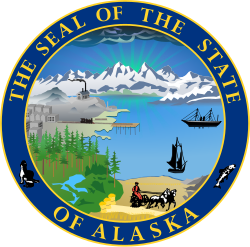Background
The 2020 measure established ranked-choice voting and nonpartisan top-four primaries for all Alaskan state and federal elections except presidential primaries. It passed with a narrow margin of 1%, with supporters of the measure outspending opponents by more than 10 to 1. [4]
In the 2022 Alaska's at-large congressional district special election, Democrat Mary Peltola won over the two Republicans who had advanced to the general election, Nick Begich III and Sarah Palin. [5] [6] This, along with the nonpartisan primary preventing a primary challenge to centrist Republican senator Lisa Murkowski in 2022, led to Republicans increasingly opposing the new system. [7]
Supporters of the initiative have said that Alaska's voting system should be repealed due to being confusing and vulnerable to manipulation, while opponents have said that the system should remain in place due to being more inclusive and giving voters more choices. [3] [7]
Opponents of the measure outspent supporters 100 to 1. [8]
This page is based on this
Wikipedia article Text is available under the
CC BY-SA 4.0 license; additional terms may apply.
Images, videos and audio are available under their respective licenses.


